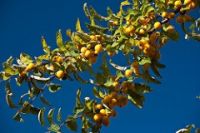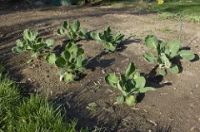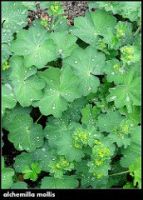Good Plant Choices For A Heavy Clay Garden
Heavy clay can be a bit of a challenge, especially when it comes to waterlogging. However, when you work to improve your soil and plant things that are well suited to the conditions then you can have the most wonderful heavy clay garden. Good choices when it comes to plant selection are key, so to help you plan improvements to your garden, here is a (partial) list of good plant choices for a heavy clay garden:
Trees:
A number of trees can cope with set, heavy clay and will help to improve the situation by drawing moisture from waterlogged soil. Trees will also provide an abundance of organic material to improve the soil over time. Some trees that will cope with heavy clay are:
 Crab apple
Crab apple
Hawthorn
Elder
Acer japonicum
Acer palmatum
Birch
Laburnum
Sorbus
Juneberry (Amelanchier lamarckii)
Monkey puzzle tree (Araucaria araucana)
Shrubs:
A shrubby under storey, borders or hedging can also be a valuable source of the biomass needed for heavy clay soil. Shrubs can also hep to improve the biodiversity in your garden and will attract a range of beneficial wildlife, pollinators and other useful insects. Here are some shrubs that can cope with heavy clay soil:
 Mahonia japonica
Mahonia japonica
Hydrangea
Ribes sanguineum
Lilac
Spiraea japonica
Viburnum (evergreen and deciduous)
Lonicera
Berberis
Cotoneaster
Euonymus fortunei
Edible Plants:
Growing your own food is something anyone with a garden can do. Those with heavy clay soil are no exception. While it is important to continue to add organic matter and to avoid standing on your vegetable beds as much as possible, there are certain vegetables that will actually enjoy what clay soils have to offer, with their firm hold, rich nutrients and moisture retention characteristics. Here are some examples:
 Brussels sprouts
Brussels sprouts
Broccoli
Kale
Kohlrabi
Cauliflower
Cabbages (all these brassicas will like clay soil as it will anchor their roots firmly)
Lettuce (shallow rooted leafy veg will like clay's ability to retain moisture)
Chard
Squash
Courgettes
Flowers:
Flowers are beautiful but also useful. They too play their part in improving biodiversity, by attracting pollinators and other useful insects. Here are just some of the flowers that will bloom happily in heavy clay soils:
 Lady's Mantle (Alchemilla mollis)
Lady's Mantle (Alchemilla mollis)
Elephant's ears ( Bergenia cordifolia)
Pulmonaria
Roses (a number of different varieties)
Asters
Geranium
Astrania
Helleborus
Sedum spectabile
Kniphofia